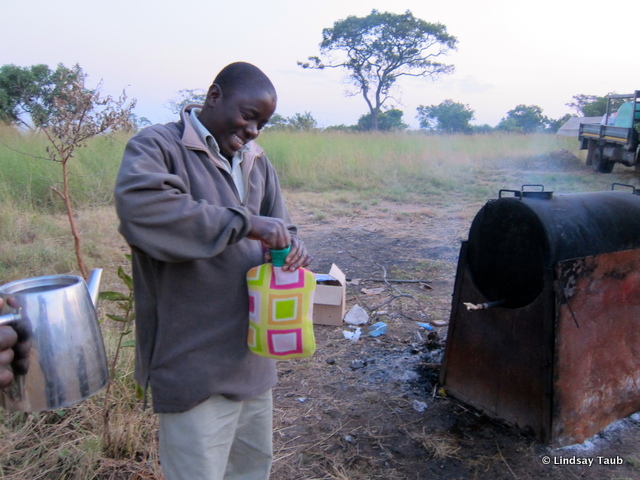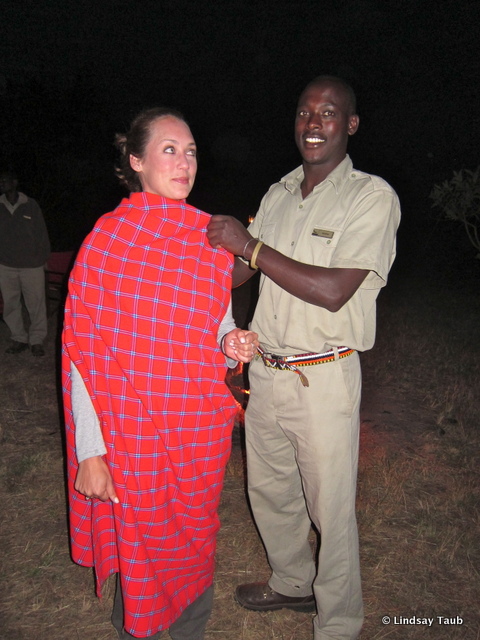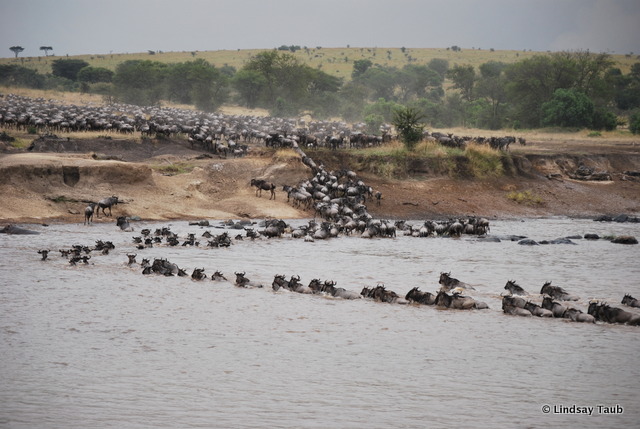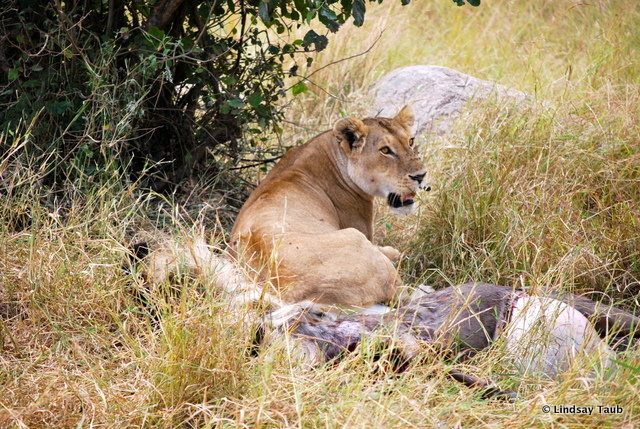The Voyage Vixens are rarely at a loss for words. But after returning from two weeks on safari in East Africa, it was hard to find the words to describe not only the journey itself but also our feelings about the journey. From bonding with Maasai warriors to sleeping among the lions and witnessing the Great Wildebeest Migration, the annual spectacle of nature that people from around the globe come to East Africa to see, it was a journey the Vixens won’t soon forget.
Words by Lindsay Taub
After returning from two weeks in East Africa, it was hard to put to words not only the journey itself but also my feelings about the journey. When asked what was my favorite part, I couldn’t pinpoint it. But somehow without fail, the one block of time that would pop into my head was spent in the Serengeti.
Michaela and I shared with each other some of our travel stories – me, envious of course that her time and adventures in Africa far outweighed mine – and I was stunned that she never visited this part of Tanzania. Thus, she asked me to share why I kept saying that I left a part of my heart in the Serengeti.
It was the middle of the trip, following time in Nairobi at Tribe Hotel which arranged various visits with artists, artisans, and the local sights, and andBeyond’s Ngorongoro Crater Lodge in Tanzania, before venturing back to Kenya, the Masai Mara (andBeyond’s vintage-styled Bateleur Camp in Kichwa Tembo), and a final jaunt in Nairobi which included a sobering visit to the Mathare slum.
Arriving on dirt runways in the middle of nowhere is a surreal and special experience that for me, transported me to a romantic place with years of fantasizing about going on safari.
To that point, I really didn’t know or understand what going “on safari” meant. I had watched “Out of Africa” and countless National Geographic documentaries, but I didn’t “get” it until my first day in the Serengeti.
I had been spoiled by the game drives at the Crater. Within minutes, literally, of arriving on the crater floor, we had our first lion sighting and it just continued from there – one spectacular sighting after another. So in three hours of driving through the Serengeti and not seeing so much as a gazelle or a zebra, I was dumbfounded.
We approached the Mara River and everything changed. They weren’t lions or any of the Big Five, but hundreds upon thousands of wildebeest, mooing and yawing as they made their way in gigantic herds towards the shores of the river in perfectly synchronized patterns.
Between July and September is the Great Migration, the spectacle of nature that people from around the world come to witness each year, in hopes of seeing a crossing. Better yet, they hope to see the lurking crocodiles take down an unsuspecting wildebeest – bystanders seeing in action the circle of life that is so vibrant and captivating in the bush.
So there we were. Waiting and waiting, watching and watching, in anticipation of the first to take the plunge as all others followed. And we waited and watched some more. Now I was beginning to understand why someone had said before I left to bring a book while on safari.
When the first herd backed away, reconvened, backed away, reconvened, and backed away yet again at the sight of crocs nearby, our ranger determined that this crossing was just not going to happen. Not at this time. And off we were in seek of the elusive leopards, black rhinos, and anything else we could spot along the way.
Some hours later, post-lunch, post elephant and giraffe sightings, and even a lioness sighting with her kill, we tried again. And this time – they crossed! We got to the river just as the first wildebeest was jumping in and just like that, the herd followed. The wildebeest are not the most attractive of animal in my humble opinion but to see this spectacle is a remarkably beautiful sight, like a choreographed dance routine that even Miss Mia Michaels of “So You Think You Can Dance” fame would envy.
The entire zigzagged show took just over an hour to complete and each and every wildebeest made it across safely. Others in later crossings weren’t so lucky. We, on the other hand, were extremely lucky – guests we shared safari stories with later that evening at andBeyond’s Serengeti Under Canvas camp had missed all of the crossings that day. It was in that moment that I realized having a successful safari (read: lots of sightings and Mother Nature in action) requires three things – a lot of patience, good timing, and some luck on your side. An experienced guide who knows how to read the animals behavior doesn’t hurt either and all of the andBeyond guides are thoroughly trained, most with more than a decade of experience behind them.
The Serengeti itself is gigantic. The safari guides, aka rangers, there have a tough job – it can take hours just to get to a certain animal’s known habitats, so if you happen to be in leopard country when others are witnessing an elephant herd with babies crossing the plains or mating lions on the other side of the valley, you’re probably going to miss it because it will take so long to get there. The lesson: if you see something, stop, because by the time you return, it’ll be gone.
While the Serengeti wasn’t the most active of places to see animal after animal, like Ngorongoro or Masai Mara, the peace and expansiveness stands alone. Sunrises and sunsets there were some of the most spectacular I’ve seen in my life, not to mention the uniqueness of where we stayed.
I truly can’t say enough about the consistent quality of andBeyond, the luxury safari company my friend and I were with throughout Tanzania and Kenya. Each property was unique with something special to offer, providing one “wow” moment after another. But Serengeti Under Canvas was magical. It’s not the most luxurious of the properties as it is a temporary camp that moves around depending on wildlife conditions, the migration, and other factors. But don’t be fooled by that statement – it’s about as luxurious as “glamping” can get.
 Each tent had comfortable beds and a toilet (a real toilet that flushed!), and a reserve of water for hand washing in a bronze-colored sink basin and brass and gold-like fixtures. Hot shower? No problem. You let your personal butler know what time you want one (and whether you want a short or long one – long meaning four minutes over about two) and just before that time, he’d come and fill a large container overhead with water of the perfect temperature in the detached, but private outdoor shower.
Each tent had comfortable beds and a toilet (a real toilet that flushed!), and a reserve of water for hand washing in a bronze-colored sink basin and brass and gold-like fixtures. Hot shower? No problem. You let your personal butler know what time you want one (and whether you want a short or long one – long meaning four minutes over about two) and just before that time, he’d come and fill a large container overhead with water of the perfect temperature in the detached, but private outdoor shower.
The secret I learned after one short shower was to turn the nozzle off while soaping and shampooing or you risk running out of water all suds up! Try it sometime – two minutes goes by very quickly. But truly, it’s a lesson in conservation – you don’t need much water to get all of your washing business done.
The food that was prepared – all of it, whether breakfast, picnic lunch, or dinner by candlelight under the stars around a fire – was superb. Truly a remarkable feat that such gourmet meals come out of a five by 10 foot tent with nothing but a makeshift stove and oven fueled by propane and firewood. The soups were some of the best I’ve had anywhere. With no nearby towns, everything at this property needs to be trucked in weekly – all supplies, water, food, alcohol, everything. When you take that into consideration – this is literally the middle of nowhere – it is true magic that such a high level of luxury can be achieved without so much as a hiccup.
Why you’d desire Wi-Fi or cell service in such a place is beyond me but in fact, you can get connected for a few hours at night when the generator is on. It’s a weak signal, but to check or send an email, it’s just fine. And I was a culprit to tweeting a couple of sunset and sunrise photos, like this one. The generator also charges rechargeable batteries in the tents during the day so that lights can be turned on inside the tents at night – once again, not just any lights, but lovely little chandeliers.

Each night returning to the tent, we’d find a hot water bottle in bed, under the covers making it toasty warm to crawl into. My friend and I joked around like silly schoolgirls and sang “in the jungle, the mighty jungle, the lion sleeps tonight…” as our butler Mauran zipped our tent shut. Despite hearing the exhilarating roar of lions in the distance, it was some of the most peaceful sleep I’ve had in years.
I felt a certain kinship with Mauran, knowing that he was not only our caretaker, but our protector in the wild, the last person we saw before tucking into our tent for the night and the first we saw upon waking in the morning. Truly you have to just trust and let go. When you’re staying in a tent knowing lions are near, you just submit. You become one of them in a sense because really it’s their land – you’re just a visitor, an observer.
 Mauran, a Maasai with an incredible smile and even better laugh who’s once killed a lion (not by choice), was there to escort us to dinner and back to our tent in the darkness, surveying the bushes and tall grass for any threats. In the morning, he was our wakeup call, gently unzipping the tent saying “good morning” as the aroma of fresh air and hot coffee entered the tent.
Mauran, a Maasai with an incredible smile and even better laugh who’s once killed a lion (not by choice), was there to escort us to dinner and back to our tent in the darkness, surveying the bushes and tall grass for any threats. In the morning, he was our wakeup call, gently unzipping the tent saying “good morning” as the aroma of fresh air and hot coffee entered the tent.
If we needed water, he brought it. If we needed help, he’d come to the rescue. If we needed a camera charged, he’d take it to the manager’s tent to do so. You name it, he took care of it. And yet, it was the way it was done that was so shockingly refreshing – gracious, respectful, friendly, and without any resentment or attitude that has unfortunately become synonymous with high end luxury, particularly in the U.S.
One night after dinner my friend and I stayed in the main tent area until the fire had gone out. We shared photos and music with Mauran and another butler, Patrick. We laughed. We asked questions about life as a Masai and where the culture is, has been, and where it’s going. We learned how to dress ourselves in the traditional red Masai fabric. We learned some Swahili — our favorite expression being “poa kachizi kama ndizi” meaning “cool like a banana.” We shared the events of the days prior. And we even shared with them cocktail recipes for how to make a classic Manhattan and a minty mojito that wasn’t too sweet.
Saying this is a special, beautiful, magical place with warm, welcoming, and inspiring people just quite simply doesn’t work. But no words do. As a scribe, it’s the most frustrating thing in the world to not have the words to describe something that you so badly want to share, but the more I think about it, the more I realize it’s not about the words; it’s about the feeling – you have to experience it to understand.
You have to smell the crisp air in the morning, hear the zipper of the tent opening and closing, hear the crunching of the grass or bug under your feet as you walk back to your tent in the darkness, feel your heart rate go up as you hear a ruffle in the bush next to your tent, sleep with a hot water bottle as your teddy bear, feel the heat of the fire wrapped in a Masai blanket, taste the delicious soup as you look up at the stars surrounded by nothing but quiet wilderness and the occasional animal noises, and more than anything, you have to remember what it’s like to be present.
The Serengeti was my serenity. I remembered what it was like to just be. And perhaps that is the reason it stands out among the many magical memories in East Africa. From witnessing the miraculous wildebeest crossing to a lion licking her fresh kill to new friendships made over a fire in the middle of nowhere and sleeping soundly among the lions, it’s where I was reminded of that all-too-important motto — that life is about living.





 Subscribe to our email to get the latest news, travel tips, tricks of the trade, and our most recent posts delivered straight to your inbox monthly.
Subscribe to our email to get the latest news, travel tips, tricks of the trade, and our most recent posts delivered straight to your inbox monthly. 